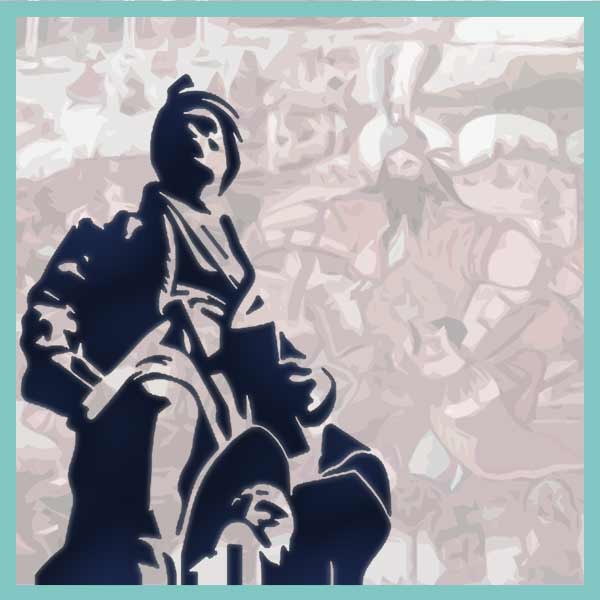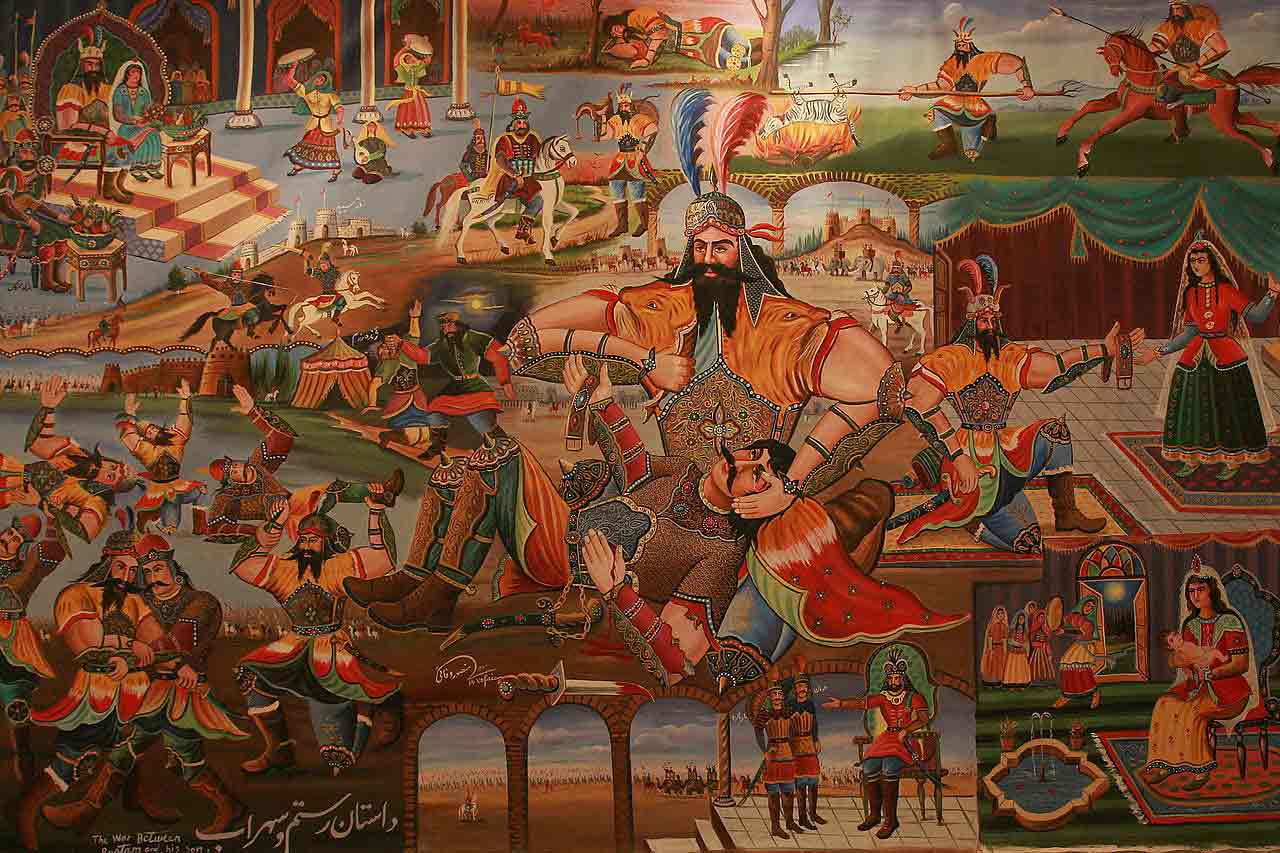National Commemoration Day of
Ferdowsi and Persian Language
Ferdowsi and Persian Language
Iranians, Afghans and Tajiks love literature, poetry in particular; therefore, in their calendars, there are days which are marked as national commemoration days of literary figures.
Ordibehešt 25, May 14, is the National Commemoration Day of Ferdowsi and Persian language. To celebrate this occasion, we had selected seven lines of his renowned epic, šâhnâme(h), book of the kings, to share the joy of immersing in the ocean of his masterpiece. These lines are chosen from the prelude of the popular story of “Rostam” and “Sohrâb”, the story of filicide by “Rostam”, the praised hero of the whole book.
Ferdowsi often starts each story with a moral advice and he does not worry to reveal the end of story from the beginning. In this story, Ferdowsi reveals the sad end, Sohrâb’s death, by analogizing the young hero to unripe “toranj”, bergamot. Falling of an unripe “toranj” is a premonition to the death of a young beloved hero.
In these lines, Ferdowsi questions faith in destiny and emphasizes on the complexity and mysteriousness of God’s will. Ferdowsi satirizes human attempts for understanding the wisdom of God believing that the human’s materialistic mind is not capable of conceiving the universe.

اَگَر تُندبادی بَر آیَد زِ کُنج
agar tondbâdi bar âyad z-e konj
اگر = [if [agar
تُندبادی = [tondbâdi] a thunder
بَرآیَد = [barâyad] arises
زِ = [z-e] from- ancient version of az
کُنج = [konj] corner
به خاک اَفکَنَد نارَسیده تُرُنج
be(h) xâk afkanad nâraside(h) toronj
به خاک= [be(h) xâk] on the ground/field
افکَنَد= [afkanad] throws
نارَسیده = [nâraside(h)] raw
تُرُنج = [toronj] bergamot orange
سِتَمگاره خوانیمَش اَر دادگَر؟
setamgâre(h) xânimaš ar dadgar?
سِتَمگاره = [setamgâre(h)] cruel
خوانیمَش= [xânimaš] we call it
اَر = [ar] ancient word for or
دادگَر= [dâdgar] fair
هُنَرمَند گوییمَش اَر بی هُنَر؟
setamgâre(h) xânimaš ar dadgar?
هُنَرمَند= [hormand] artist = here means talented
گوییمَش= [guyimaš] we call it
اَر = [ar] ancient word for or
بی هُنَر= [bihonar] non-artist, here means incompetent
اَگَر مَرگ داد اَست بیداد چیست؟
agar marg dâd ast bedâd čist?
اَگَر= [agar] if
مَرگ= [marg] death
داد= [dâd] just/fairness
اَست = [ast] is
بیداد = [bidâd] unjust/unfairness
چیست = [čist] what is
زِ داد این هَمه بانگ و فَریاد چیست؟
z-e dâd in hame(h) bâng-o faryâd čist?
زِ= [z-e] from/ ancient form of az
داد= [dâd] just/fairness
این هَمه= [in hame(h)] so much
بانگ= [bâng] shout
و= [o] and
فَریاد = [faryâd] crying
چیست = [čist] what is
اَز این راز جانِ تو آگاه نیست
az in râz jân-e to âgâh nist
اَز= [az] from/of
این = [in] this
راز= [râz] secret
جانِ تو = [jân-e to] your mind/ your soul
آگاه = [âgâh] aware
نیست= [nist] is not
بِدین پَرده اَندَر تو را راه نیست
bedin parde(h) andar to râ râh nist
بِدین= [bedin] to this
پَرده = [parde(h)] cover
اَندَر = [andar] inside
تو را = [to râ] for you
راه = [râh] way
نیست= [nist] is not
هَمه تا دَرِ آز رَفته فَراز
hame(h) tâ dar-e âz rafte(h) farâz
همه = [hame(h)] all/everyone
تا = [tâ] until
دَرِ= [dar-e] gate of
آز = [âz] greed
رَفته = [rafte(h)] gone
فَراز= [farâz] up/ above
به کَس بَرنَشُد این دَرِ راز باز
be(h) kas bar našod in dar-e râz bâz
به کَس = [be(h) kas] to anyone
بَرنَشُد = [bar našod] didn’t get
این = [in] this
دَرِ= [dar-e] gate of
راز= [râz] mystery
باز= [bâz] open
بِدین کارِ یَزدان تو را راز نیست
bedin kâr-e yazdân to râ râz nist
بِدین= [bedin] to this
کارِ = [kâr-e] act of
یَزدان = [yazdân] God of Persia
تو را= [to râ] to you
راز= [râz] mystery
نیست= [nist] is not
اَگَر دیو با جانت هَمباز نیست
agar div bâ jânt hambâz nist
اگَر= [agar] if
دیو= [div] daemon
با = [bâ] with
جانت= [jânt: jânat] your soul/ your mind
هَمباز = [hambâz] partner
نیست= [nist] is not
بِرَفتَن مَگَر بِهتَر آیَدت جای
beraftan magar behtar ayadt jây
بِرَفتَن= [beraftan] to go/ to die
مَگَر = [magar] but
بِهتَر= [behtar] better
آیَدت = [âyadt: âyadat] brings to you
جای = [jây] place
چو آرام گیری به دیگر سَرای
čo ârâm giri be digar sarây
چو= [čo] in order to
آرام = [ârâm] peaceful
گیری= [گیری] to become
به دیگَر= [be(h) digar] to the next / to the another
سَرای= [sarây] world

مُقَدَّمه یِ داستانِ سُهراب در شاهنامه یِ فِردوسی
اَگَر تُندبادی بَر آیَد زِ کُنج
به خاک اَفکَنَد نارَسیده تُرُنج
سِتَمگاره خوانیمَش اَر دادگَر؟
هُنَرمَند گوییمَش اَر بی هُنَر؟
اَگَر مَرگ داد اَست بیداد چیست؟
زِ داد این هَمه بانگ و فَریاد چیست؟
اَز این راز جانِ تو آگاه نیست
بِدین پَرده اَندَر تو را راه نیست
هَمه تا دَرِ آز رَفته فَراز
به کَس بَرنَشُد این دَرِ راز باز
بِدین کارِ یَزدان تو را راز نیست
اَگَر دیو با جانت هَمباز نیست
بِرَفتَن مَگَر بِهتَر آیَدت جای
چو آرام گیری به دیگر سَرای
Prelude of Sohrab’s Story in Ferdowsi’s Shahnameh
Translation: Arthur George Warner & Edmund Warner
Now if a rude gust should arise and bear;
A yet unripened orange to the dust.
Shall I describe this as unfair or fair;
Shall I pronounce it tyrannous or just?
Where is the devil if we all must die?
Why clamour and appeal from what is right?
Thy spirit wotteth not this mystery;
Beyond the Veil there is no path in sight.
We all must reach the insatiable door,
The greedy door that openeth twice for none;
Yet so a better place may be in store
For thee, and heaven’s eternal rest be won.
Unless death swallowed all men up in turn
Earth would be trampled down by young and old;

